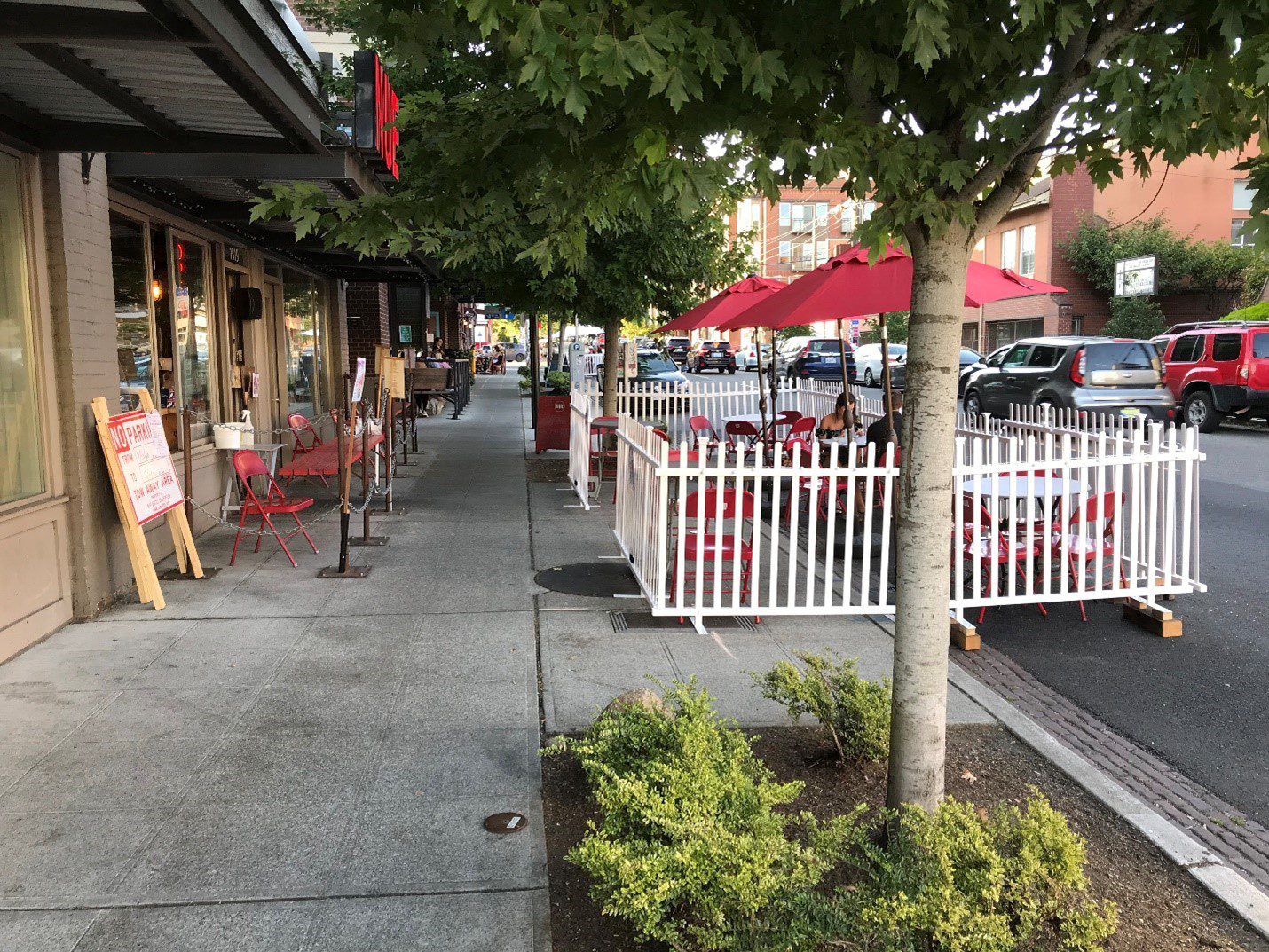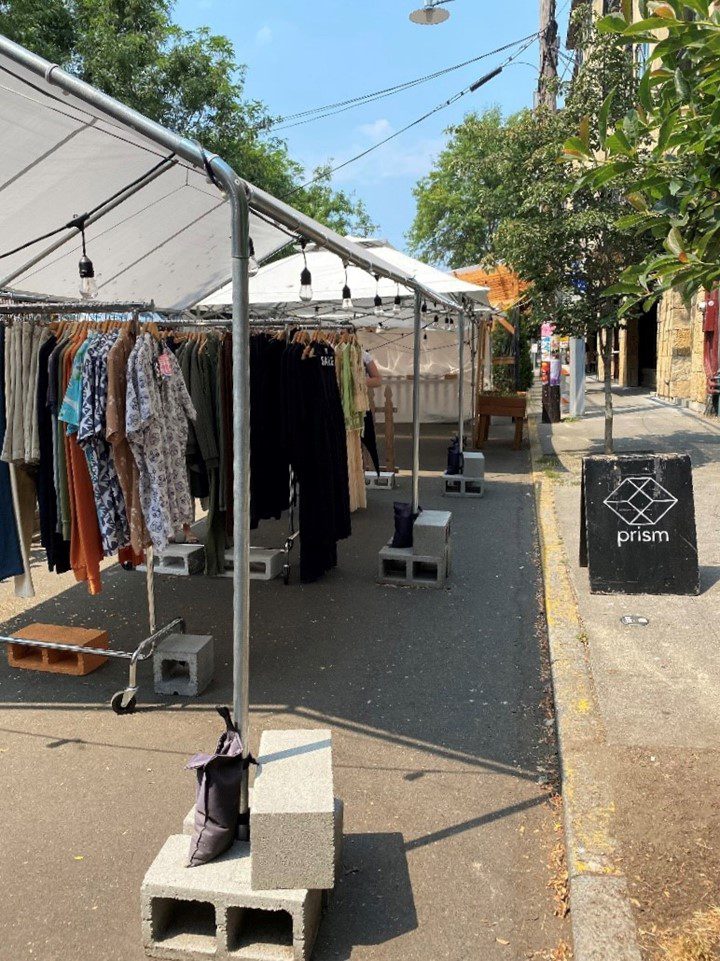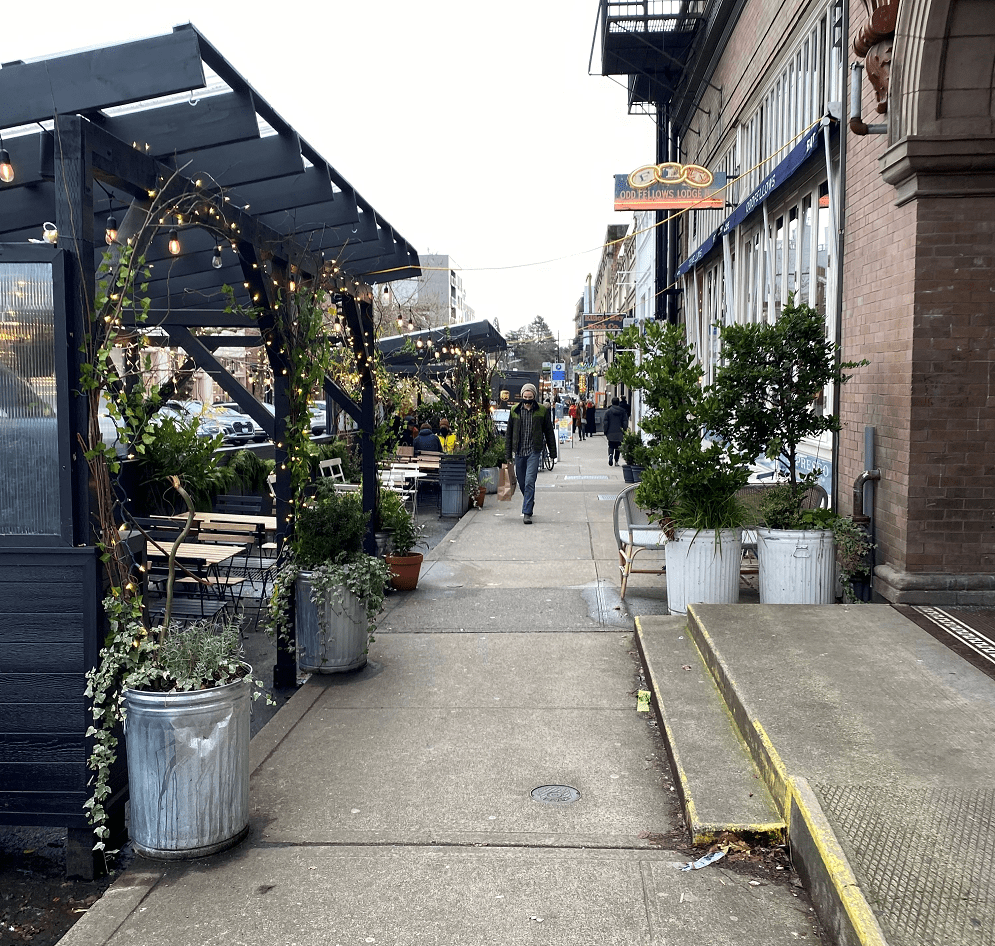 An outdoor eating area located at Oddfellows Cafe in Seattle's Capitol Hill neighborhood. Photo: SDOT
An outdoor eating area located at Oddfellows Cafe in Seattle's Capitol Hill neighborhood. Photo: SDOT Please note: this blog post is available in additional languages via the links below, in Spanish, Vietnamese, Korean, Chinese (Traditional and Simplified), Somali, Amharic, and Tagalog.
- Gracias a las más de 10,000 personas que respondieron la encuesta de restaurantes y tiendas al aire libre. Esto es lo que escuchamos. Además, ¡el programa se extiende hasta el 31 de enero del 2023!
- Cảm ơn hơn 10.000 người đã tham gia vào cuộc khảo sát ăn uống và bán lẻ ngoài trời. Đây là những gì chúng tôi được biết. Thêm vào đó, chương trình sẽ được kéo dài cho đến hết ngày 31 tháng 1 năm 2023!
- 실외 식당 및 소매 상품 전시 설문 조사에 응해주신 10,000명 이상의 분들께 감사드립니다. 다음은 저희가 수집한 내용입니다. 또한 본 프로그램은 2023년 1월 31일까지 연장됩니다!
- 感謝參與戶外餐飲和零售調查的 10,000 多人。這是我們得到的反饋。此外,該計劃延長至 2023 年 1 月 31 日!
- 感谢参与户外餐饮和零售调查的 10,000 多人。这是我们得到的反馈。此外,该计划延长至 2023 年 1 月 31 日!
- Waxaa mahad ugu sugnaatay 10,000+ qof ee qaadatay sahanka cuntada dibadda iyo tafaariiqda. Waa kan waxa aan maqalnay. Waxaa intaa dheer, barnaamijku waa la kordhiyey ilaa Janaayo 31, 2023!
- ከቤት ውጭ የመመገቢያ እና የችርቻሮ ዳሰሳ የወሰዱ 10,000+ ሰዎችን እናመሰግናለን። የሰማነው ይኸ ነው። በተጨማሪም፣ ፕሮግራሙ እስከ ጥር 31 ቀን 2023 ድረስ ተራዝሟል!
- Salamat sa 10,000+ na katao na lumahok sa pagsisiyasat tungkol sa panlabas na kainan at pagtitingi. Narito ang aming narinig. Karagdagan pa, ang programa ay pinalawig pa hanggang Enero 31, 2023!
Since June 2020, Safe Start permits have helped Seattle restaurants and small businesses during the COVID-19 pandemic. These permits make it easier to open outdoor spaces for dining, shopping, or other uses. Our Safe Start permits include outdoor cafés, retail merchandise displays, food trucks, vending carts, and community street closures like The Patio in Columbia City. Through Safe Start permits, we simplified the application process and waived permit application fees. This provides more opportunities for businesses to serve customers safely outdoors by using streets, sidewalks, and curb spaces.
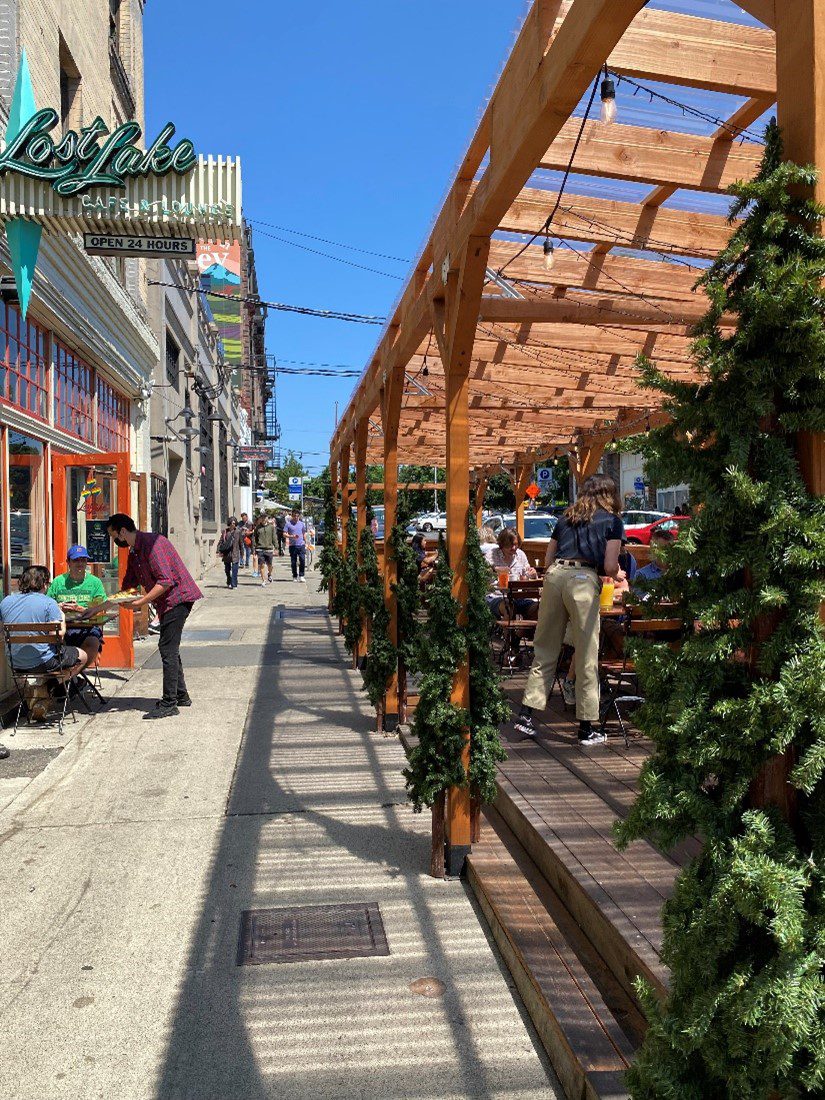
So far, more than 250 businesses throughout Seattle have taken part in the temporary Safe Start permit program. Since these permits are different from how we managed public spaces before the pandemic, we’re using this experience to improve our permitting programs. To achieve this, we had conversations with permit holders, restaurants, local businesses and trade groups, community-based organizations, and the general public to understand how they are working.
“The COVID-19 pandemic has caused considerable hardship for small businesses that for years have served as mainstays in our communities and shaped the character of our neighborhoods. One silver lining in this challenging time has been seeing how these small businesses take and run with new opportunities to activate Seattle’s streets with outdoor dining and retail activities. As the pandemic continues, furthering Safe Start permits means continuing to provide an important tool for supporting Seattle’s small businesses, keeping communities healthy, and creating a future that is vibrant, welcoming, and flourishing for all neighbors. I am committed to achieving that future and grateful to Councilmember Strauss for his consistent and determined leadership supporting these outdoor spaces.”
– Seattle Mayor Bruce Harrell
“These survey results show that small businesses and community members overwhelmingly welcome the café streets that have become a part of the urban fabric in Seattle. Café streets and outdoor dining and retail have given our neighborhood small businesses the flexibility they need to thrive during changing public health guidelines and new variants, while adding vibrancy to our neighborhoods and business districts. Just a few days ago I ate outside on Ballard Avenue in 37-degree weather and all outdoor seats were occupied. The number of people sitting outside for dinner that night in Ballard shows how the Safe Start program and businesses’ entrepreneurial spirit is working, even in our cold and wet Seattle winters.”
– Seattle City Councilmember Dan Strauss (District 6 – Northwest Seattle)
This past summer, we invited thoughts through an online survey. The survey ran from July 1 – August 15, 2021. It turns out, a lot of people wanted to provide input: more than 10,000 people completed the survey!
As we expected, we heard the most from people in neighborhoods with many Safe Start permits (Ballard, Fremont, and Capitol Hill). To ensure more inclusivity once the survey closed, we proactively reached out to communities we hadn’t heard from to make sure their voices were considered, including those in Southeast Seattle.
Online dashboard helps showcase public feedback – check it out!
We created this interactive online dashboard to help showcase what we heard. We encourage you to check it out if you are interested in learning more.
Here are a few of our major findings from the survey responses:
- A large majority of residents, visitors, and local business owners shared their support for these new spaces on our streets and sidewalks.
- Almost all community survey-takers (97%) indicated they regularly dine out, shop, or purchase take-out food, and 93% indicated they ‘live or work near or frequently visit a neighborhood with outdoor cafes, retail displays, or food vendors; in curb spaces or on sidewalks.’
- A high majority of people who took the survey expressed overall support for cafés on sidewalks (90%) and in curb spaces (90%), full-block street closures for pedestrian-only dining and shopping (90%), and food trucks or carts on sidewalks (83%) or curb spaces (89%). Support for retail displays on sidewalks was somewhat lower (65%), and displays in curb spaces were also lower (59%) but still received support from a majority of survey-takers. In general, respondents shared positive sentiments across all categories included in the Safe Start permit program survey.
The graphic below shows the degree of support for the types of street use under the Safe Start program:
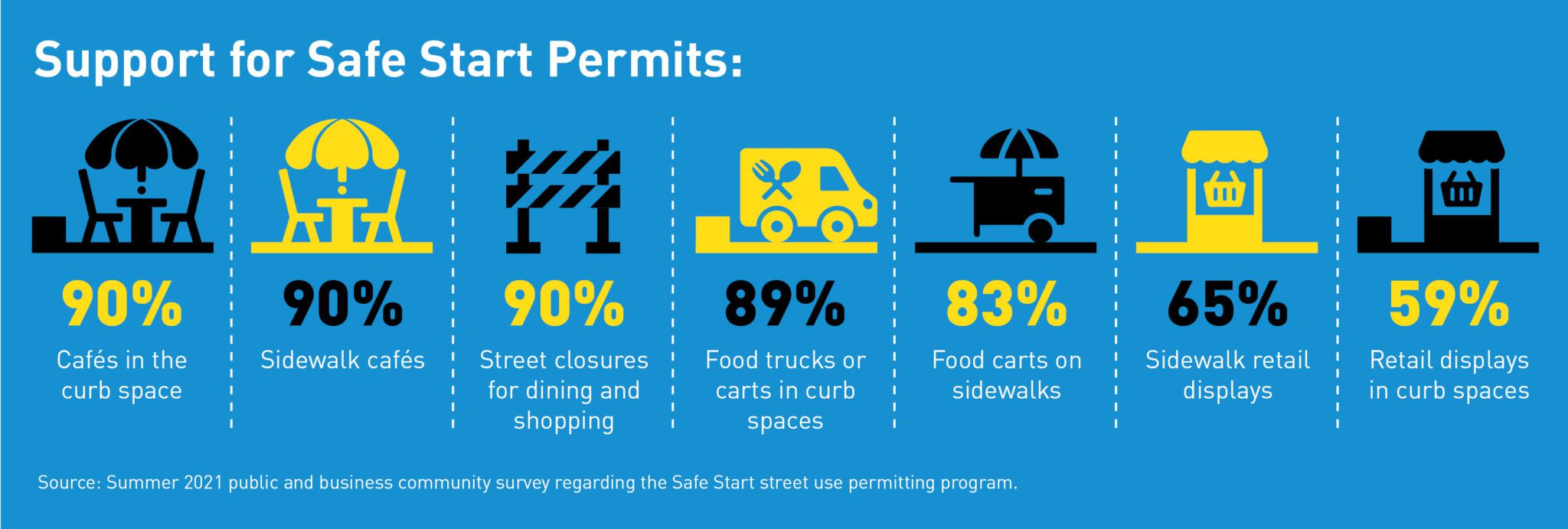
Here are a few direct quotes from our survey takers to provide a snapshot of some feedback themes that we frequently heard:
- “I absolutely love the atmosphere created by supporting a more pedestrian-friendly neighborhood.”
- “The streets closures have been one of the best things to happen in our city in the last two years. It opens the streets for people to use and enjoy, instead of just being for cars. I hope the city continues opening and expanding street space for people in neighborhood centers.”
- “I think it is magical – it encourages community, supports business, and has created a gathering space that helps the neighborhood.”
- “I think this has been a wonderful addition to our city’s community life and adds to the viability and uniqueness of neighborhoods and small businesses.”
While many people generally support these spaces, respondents also shared concerns they’d like addressed about how they are currently designed, managed, and operated.
We are thinking about ways to help address some of these public concerns, including:
- Ensuring there is enough space on sidewalks for people to walk and roll by safely. As we allow these businesses to use public spaces, we need to make sure safety and mobility for people of all ages and abilities are prioritized.
- Balancing our curb space to ensure access to commercial areas. With new uses of our curb spaces for dining, vending, and retail displays, some respondents mentioned the effects to on-street parking and traffic congestion in the area. Ensuring safe access for the elderly and people with disabilities and loading and unloading is especially important.
- Prioritizing safe and pleasant dining experiences in street spaces. Some people noted their enjoyment, primarily when located in the curb space, can be limited by nearby traffic, as well as the exhaust and noise from vehicles.
What’s next? We’re extending the program through January 31, 2023.
We appreciate everyone who took the time to participate in our survey—your input is valuable and helps inform our future planning efforts!
We know many Seattle businesses are still struggling with COVID-related uncertainty and economic recovery efforts. To make sure we get this right, we worked with Mayor Bruce Harrell and City Councilmember Dan Strauss to extend the Safe Start program through January 31, 2023 (it was expiring on May 31, 2022). This spring, we will publish a draft proposal, and the extra time gives business owners and the public ample time to read it and provide feedback before finalizing the new rules.
What does this all mean for current Safe Start permit holders?
You can expect to see draft rules this spring, which will be finalized in summer 2022 before temporary permits expire on January 31, 2023. Our proposal will include more details on the transition process for businesses wanting to continue participating.
Please stay tuned to our Safe Start permits web page for the latest information, and keep an eye out on our SDOT Blog for future updates on the program. Also, feel free to email us at publicspace@seattle.gov with any questions.
Thanks again for your interest in this program!
